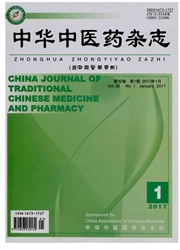

 中文摘要:
中文摘要:
目的:通过研究丹酚酸A(SalA)对肝癌HepG2细胞株线粒体跨膜电位的影响,来探讨SalA抑制肝癌细胞增殖的作用机制。方法:以肝癌HepG2细胞为靶细胞,采用MTT法观察不同浓度的SalA对HepG2细胞增殖的影响;通过Hoechst和Mito-tracke双染,经Thermo Cellomics ArrayScan VTi检测SalA对HepG2细胞的线粒体跨膜电位和细胞毒性的影响。结果:SalA对HepG-2细胞增殖有抑制作用,并呈现剂量依赖性;SalA能降低HepG2细胞内线粒体跨膜电位水平,且随浓度增加降低越明显。结论:SalA具有抑制肝癌HepG2细胞增殖的作用,其作用机制可能与降低线粒体跨膜电位,通过线粒体途径触发细胞凋亡有关。
 英文摘要:
英文摘要:
Objective: Study the effect of Salvianolic acid A(SalA) on mitochondrial transmembrane potential of human hepatocellular carcinoma cell line HepG2,to explore the mechanism of SalA in vitro inhibition of hepatocellular carcinoma cell.Methods: Hepatocellular carcinoma cell line HepG2 were used as target cells,and MTT method was used to observe the effects of different concentrations of SalA on HepG2 cells.Thermo Cellomics ArrayScan VTi was used for detecting the effect of mitochondrial transmembrane potential and cytotoxicity of Salvianolic acid A(SalA) on HepG2 cells by Hoechst and Mito-tracke double staining.Results: The growth of HepG-2 cells was inhibited by SalA,and show a certain degree of dose dependent.Through the Thermo Cellomics ArrayScan VTi testing found that SalA can reduce the mitochondrial transmembrane potential levels of HepG-2 cells,and decreased more obviously with the increasing concentration.Conclusion: SalA can inhibit HepG2 cells.Its mechanism may be decreasing mitochondrial transmembrane potential,and triggering the cells apoptosis.
 同期刊论文项目
同期刊论文项目
 同项目期刊论文
同项目期刊论文
 Mechanism for hepato-protective action of Liangxue Huayu Recipe(LHR): Blockade of mitochondrial cyto
Mechanism for hepato-protective action of Liangxue Huayu Recipe(LHR): Blockade of mitochondrial cyto 期刊信息
期刊信息
